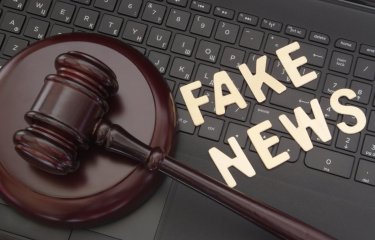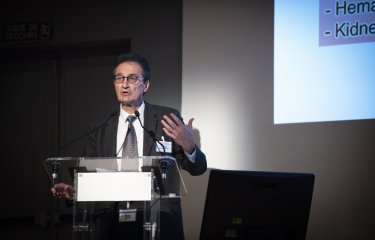On November 2, 2020, Senlis Criminal Court convicted the author of a misleading video claiming that the Institut Pasteur invented COVID-19, posted online on March 17, 2020, of public defamation towards the Institut Pasteur. The author's words, which were untrue and unfounded and were based on a misinterpretation of a patent submitted in 2004, led to a wave of strong reactions against the Institut Pasteur. Some members of staff and even some of their families were the victims of hateful messages, phone calls and/or emails, insults and threats. For this reason, for the first time since its inception, the Institut Pasteur had no other choice but to lodge a complaint for defamation, without prejudice to the right to freedom of expression, which the Institut Pasteur recognizes and defends. We look back at the story of a case of fake news.
March 17, 2020: a misleading, defamatory video posted online
On March 18, 2020, the Institut Pasteur became aware that a video which included defamatory passages about the Institut Pasteur and its staff had been posted online the previous day. Based on a misinterpretation of a patent filed in 2004, the video claimed that the Institut Pasteur had invented COVID-19 for commercial gain.
The false, groundless claims unfortunately provoked a widespread reaction, and the Institut Pasteur, its staff and even some of their families were the victims of hateful messages, phone calls and/or emails, insults and threats.
March 17-20, 2020: an unprecedented fact-checking campaign
The video was widely circulated on social media and several conventional media outlets also took an interest, forcing the Institut Pasteur to refute the claims.
See Coronavirus: Institut Pasteur warns against false information circulating on social media
Given the viral nature of the initial erroneous information, a large-scale fact-checking campaign was launched and extensively shared via a wide variety of platforms (threads, videos, series, etc.) and by several institutions and official outlets.
March 26, 2020: a complaint lodged and legal proceedings initiated for defamation
Given the impact of the video and the threats and violence it caused, the Institut Pasteur had no other choice but to lodge a complaint for defamation (for the first time since its inception in 1887), without prejudice to the right to freedom of expression, which the Institut Pasteur recognizes and defends.
The Institut Pasteur immediately lodged a complaint.
At the same time, given the serious breach of public order caused by the video, the Senlis Public Prosecutor decided to initiate legal proceedings for defamation against the author of the video, an unusual step given the policy of this Prosecutor.
October 7, 2020: hearing at Senlis Criminal Court
A hearing was subsequently held on October 7, 2020 at Senlis Criminal Court so that the author of the video could answer to the charge of defamation. At the hearing, after explaining the consequences of the video, especially the fact that several Institut Pasteur employees had been victims of harassment, the representative of the Institut Pasteur asked:
- for the verdict to be published on the author's Facebook profile and page;
- and in four newspapers of the Institut Pasteur's choice;
- for a payment of €1 by way of damages.
The Institut Pasteur was represented by criminal defamation lawyer Antoine Comte.
The accused pleaded for his acquittal.
November 2, 2020: conviction of the perpetrator
On November 2, 2020, Senlis Criminal Court found the author of the video to be guilty of defamation against the Institut Pasteur and also liable for all the damages sought by the civil party, the Institut Pasteur. As a result, the court partly upheld the Institut Pasteur's requests and those of the Prosecutor, sentencing the author to:
- a suspended fine of €5000* [*to be paid in the event of a subsequent conviction];
- a payment of €1 by way of damages;
- €800 under article 475-1 of the French Criminal Procedure Code (legal fees);
- publication on his Facebook page.

January 11, 2023: the author of a misleading video sentenced for of public defamation
If targeted by misinformation, conspiracy theories and hateful claims spread in misleading videos of this nature, which unfortunately are still being shared and disseminated, the Institut Pasteur reserves the right to lodge an official complaint whenever it deems it to be necessary.
In addition to strongly refuting false allegations and clarifying the facts of the situation and the scientific basis, taking action in this way is a means of denouncing insults and threats to the Institut Pasteur's employees and scientists and preventing such incidents from happening again.





